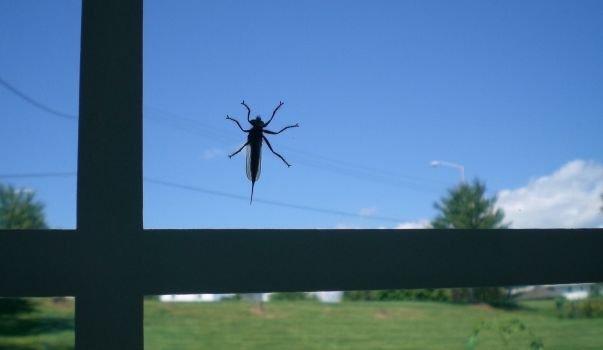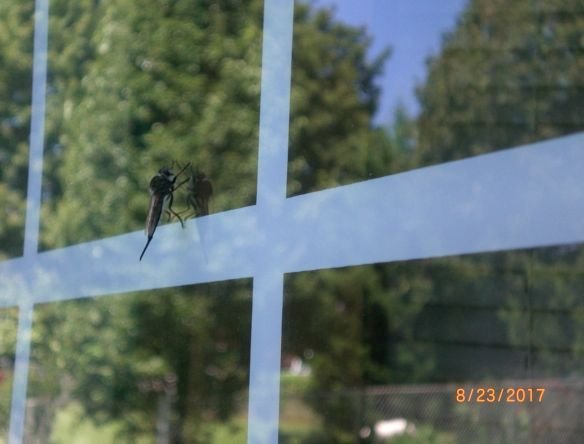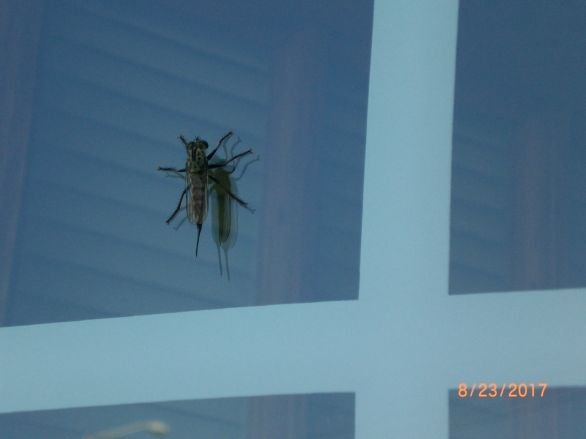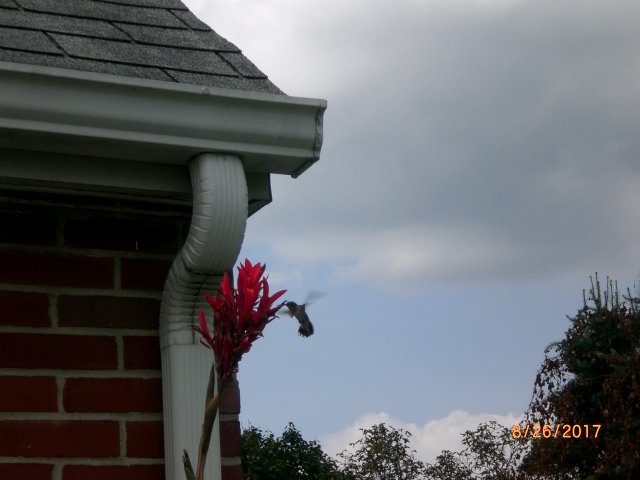"My ABC's Of Nature" Series-Letter "H" Continued-Part 14
On this day, I was leaving my house, opened the inside door, and I saw this huge thing on the outside of my storm door. I told you that these insects just kept appearing all around me. My research told me that this insect is called a "Horntail Wasp."

It looks like it has a huge stinger, but the Horntail Wasp doesn't sting or bite. That thing that looks like a stinger is actually called an "ovipositore" which is found on the females. When the female is ready to lay her eggs, she finds a tree that is in bad shape or dying because those trees have soft wood. She uses her "horn" (ovipositore) to split the wood of a tree trunk. She then injects her 2-7 eggs deeper into the tree trunk.

One year later, the adult Hornatil Wasps chew themselves out of the tree trunk leaving circular holes approximately the size of a pencil. Adults feed on water and nectar. Horntail Wasps are native to North America and can be seen June through early October.

The tiniest birds in the world are Hummingbirds. Their feet are weak and they can barely walk. Their weight can be anywhere from 2 and 20 grams. To give you an idea of their weight; weigh a penny and you will find that it is 2.5 grams. Hummingbirds can see farther and hear better than humans. They are the only birds that can hover in mid air, fly backwards and forwards, sideways and upside down. They can even fly up to speeds of 25-30 miles per hour.

They lap up nectar with their tongues, aided with the tiny hairs on their tongues. Females build their nests, lay 2 eggs, and the babies remain in the nest for 3 weeks. Many Hummingbirds die in the first year of their life, but their average lifespan is approximately 5 years.
Information Source: dixiepest.com, worldofhummingbirds.com
Image Source: 100% own work using a Casio Exilim Digital Camera.
Nice photos and presentation. :)
Thanks so much for the nice compliment! : )
Another interesting bug! Good hummingbird capture..you do have to be quick!
Thanks so much!
ah, now i know the name of the insect, will post it later.
Thank you my friend. 😃😃
Glad I could help. Thanks so much for the tip. : )
tip!
Sorry, the tip is higher then your deposit.
You can check your balance by sending 0.001 SBD to @tipu with memo: balance
(the minimal tip is 0.1 SBD)
Hi @whatisnew! @ekavieka is sending you 0.1 SBD tip and @tipU upvote :)
:)
@tipU - send tips by writing tip! in the comment, get share of the profit :)Real nice shot of Hummingbird with gutter to show size.
Thanks!
You got a Hummingbird!! yay!! I would like a pic of a Hawk too! =))
Nice of you to explain more about the wasp's anatomy..I would readily have thought that her ovipositore was a stinger!!
Yup...I was so happy to get that tiny photo of the Hummingbird and just wish I could have gotten a closer photo. Oh, I did have a pic of a white headed hawk sitting on a huge tree top. I enlarged it as much as I could and you still couldn't tell what it was so I deleted it.
You should have seen my face when I opened the door and saw that wasp! LOL! I thought it was a humongous stinger coming out of that thing! LOL!
Aww that's a real pity about the hawk photo!
I'm sure that scary-looking ovipositore plays a dual role of helping the wasp to 'protect' itself haha
I was thinking the same thing! LOL!